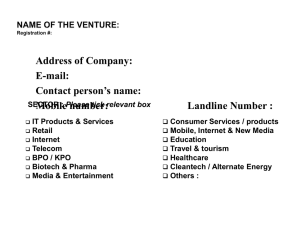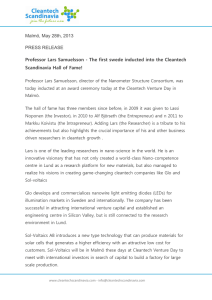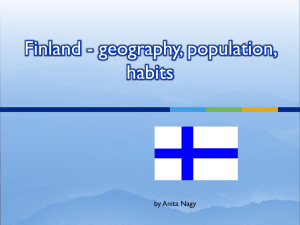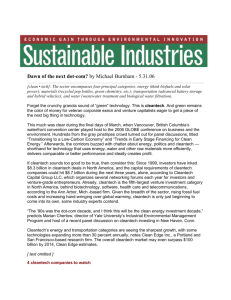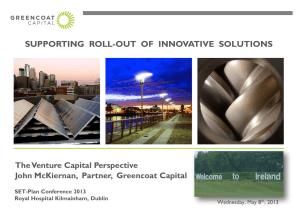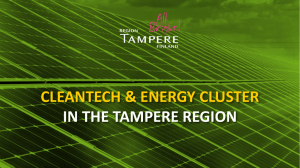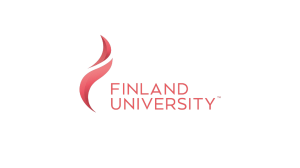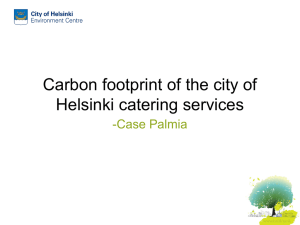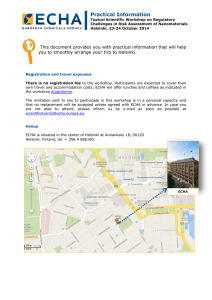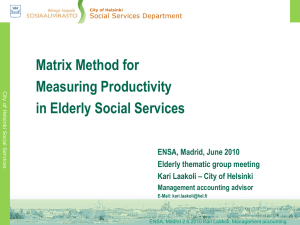How does regional policy support the development of cleantech sector
advertisement
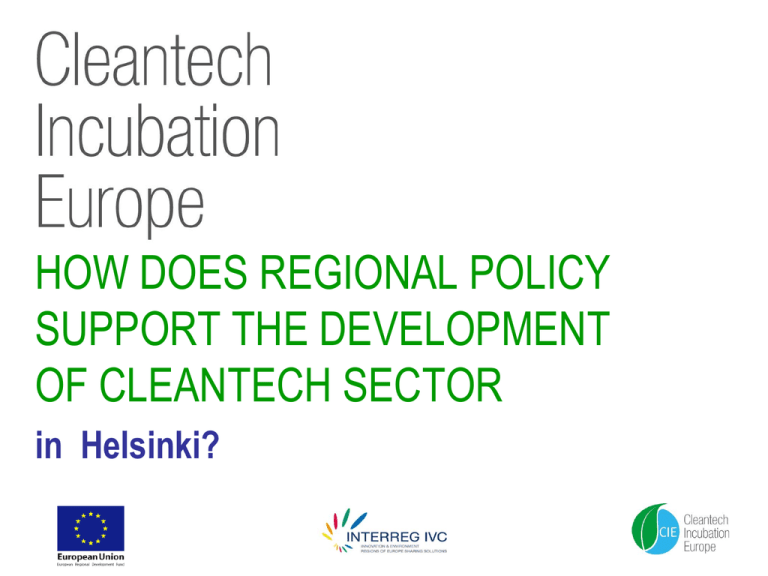
HOW DOES REGIONAL POLICY SUPPORT THE DEVELOPMENT OF CLEANTECH SECTOR in Helsinki? Overview of the Regional Context: Overview of the Regional Context: Approximately 1.4 million inhabitants in the Helsinki Region City of Helsinki: 600 000 inhabitants Around 40 000 enterprises in Helsinki (app. 60 000 in the metropolitan area) Approximately 250 000 jobs in the Helsinki based enterprises 7 universities, 6 universities of applied sciences Most of the national / state research institutes are concentrated in Helsinki Around 90 000 students in the higher education institutions GDP per capita in the Helsinki Region: 45 241 euros (2009) GDP per capita in the EU (27 member states): 24 400 euros (2010) 45 per cent of population in the Helsinki Region have a tertiary level education Overview of the Regional Context: Jobs by sectors in Helsinki 1. Social and health care services 2. Wholesale and retail trade 3. Information and communication sectors 4. Knowledge-intensive business services 5. Public administration 6. Education 7. Industry In relative terms (sectors which are strongly concentrated in Helsinki): 1. 2. 3. 4. 5. Film, TV, Radio etc. Publishing Communications Finance and insurance Information services, software etc. The launch of Regional Policies to support cleantech • Which are the main strategies to support cleantech, implemented by means of regional policies from 1995-2000 to date? • Regional Strategic Plans and Regional Development Programmes by Uusimaa Regional Council • Economic Development Strategies at local level • Competitiveness Strategy of the Helsinki Region (14 municipalities in the Helsinki Region) • Strategy Programme of the City of Helsinki 2013-2016 (being prepared) • “Growth Agreement” (forthcoming, spring 2013) between the Central Government and the municipalities from the Helsinki Region • The Centre of Expertise Programme, see http://www.oske.net/en/ • The Centre of Expertise Programme will be replaced by a new INKA programme (Innovative Cities) from 2014 onwards Regional Policy to support Investments - Investment policies are drafted on local and national levels in Finland - City of Helsinki makes (cleantech related) investments e.g. in connection with: - New city districts (e.g. waste management, smart grids, energy efficiency) - Environmentally sustainable renovation of existing urban infranstructure - Energy production - Public transport - Implementation of innovative public procurement - Regional Policy to support Research - In Finland, research policies are designed on national level - Main players are e.g. The Academy of Finland and Tekes (the Finnish Funding Agency for Technology and Innovation) - R&D investment accounts for 4% of GDP, ~7 billion euros (30% by the public sector and 70% by private sector) - To some degree, local policies support research as well - City of Helsinki supports (small scale) research related to: - Urban research - Innovation research which is linked to e.g. its own service development - Urban infrastructure development Regional policy to support tools, infrastuctures, clusters • Cleantech cluster is developed currently within the Centre of Expertise Programme (OSKE) • OSKE programme is funded 50 % by the Finnish Government and 50 % by local governments • The budget is set annually and the cleantech cluster’s part of this budget is around 1.3 million euro, of which 220 000 euro in Uusimaa region. • With this seed money, the cleantech cluster has implemented projects to a total value of 65 million euro (12 million euro in Uusimaa region) • In addition, national support tools of e.g. Tekes are available for cleantech related RDI projects The influence of the policies to support cleantech on the regional system • The activities of the national cleantech cluster (within OSKE programme) have contributed to the creation of more than 500 new jobs in the Finnish cleantech sector. • In the last few years, the cluster has implemented projects to a total value of 65 million euro (12 million euro in Uusimaa region) • It is difficult to assess the influence of different local, regional and national policies on the development of the cleantech business sector • The aim at national level is to increase the total turnover of the Finnish cleantech sector from current 22 billion euros to 40 billion by 2018 Concluding Remarks • In Finland, the policies related to research and support to cleantech sector are mainly drafted on national and local levels rather than regionally. • Cities can potentially influence the development of the cleantech sector (by investing in cleantech and developing procurement for innovation) • Physical, cleantech specific innovation environments / platforms are missing – E.g. Envipark and Energy Center in Torino • The new national Innovative Cities (INKA) programme 2014-2020 will be implemented on regional level – “Smart Sustainable City” is one of the thematic areas being prepared in Helsinki Region • Policies regarding incubators and their funding is changing at the same time
